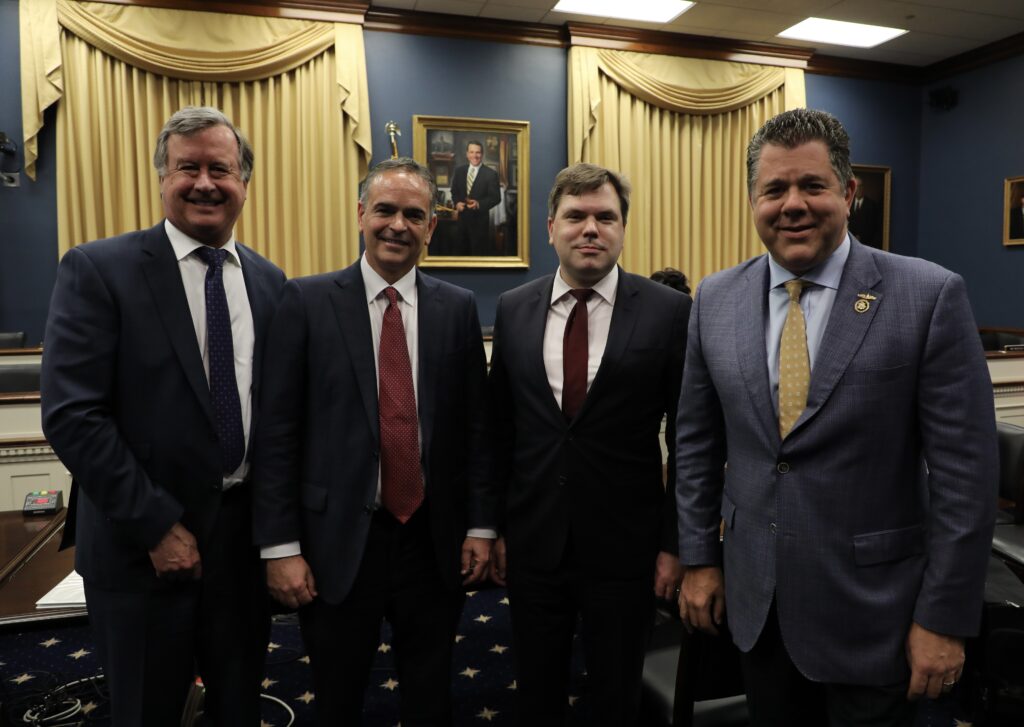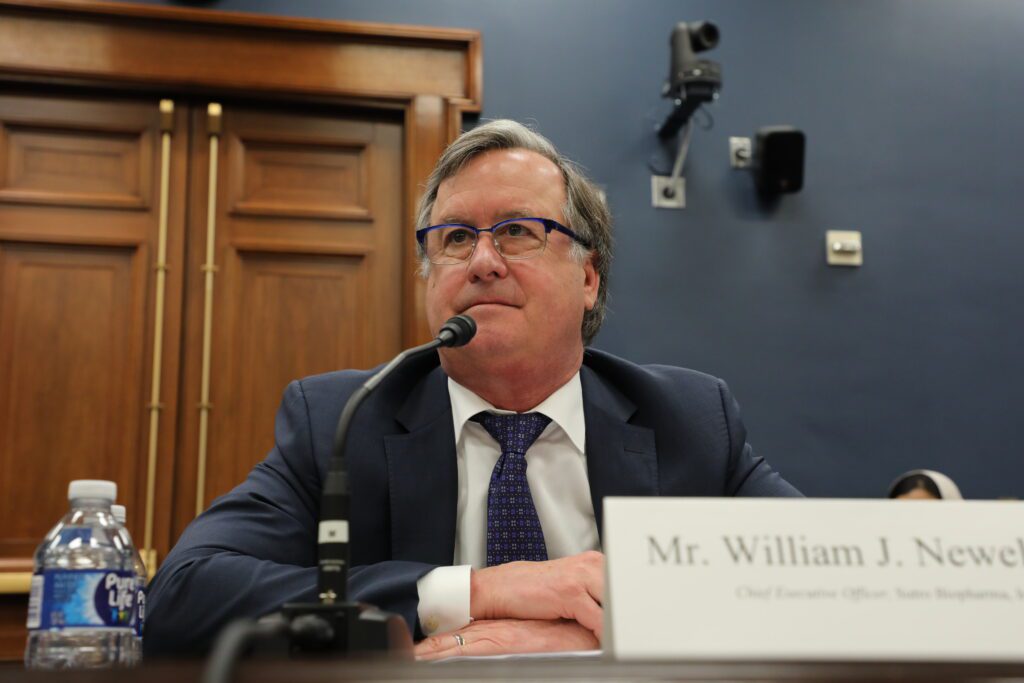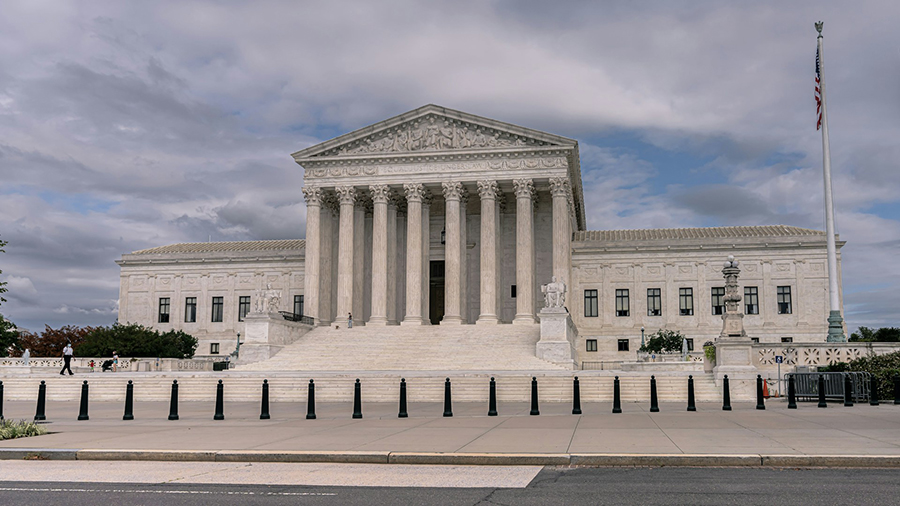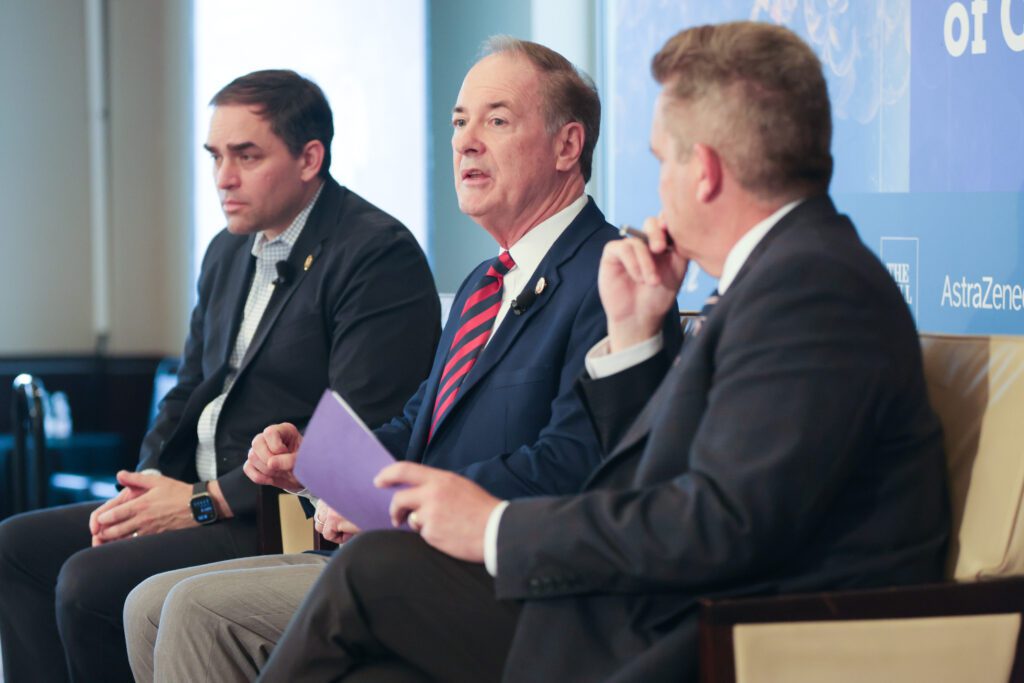Emerging biotechs working on future cures need modernized regulation, policy to preserve and incentivize investment, and strong intellectual property protection, a biopharma CEO told Congress on May 8.
In testimony before the House Small Business Committee hearing, “Stifling Innovation: Examining the Impacts of Regulatory Burdens on Small Businesses in Healthcare,” Sutro Biopharma CEO Bill Newell, a BIO Board Member, called for measures to help the small firms that are behind much of America’s biotech innovation.
“Small biotech companies and their investors are particularly sensitive to the U.S. policy environment in which we operate. Ensuring a robust domestic biotechnology industry is rightfully recognized as a critical national security issue,” according to Newell’s written testimony. “In addition, it is also an economic juggernaut, with high growth potential and high wages across the country. Thus, it is critical that we implement and support policies that encourage our development and reexamine policies that deter investment and delay treatments.”
Newell’s testimony called for improvements impacting:
- access to capital;
- IP protections;
- modernized, predictable Food and Drug Administration (FDA) regulation;
- fixes to investment disincentives in the Inflation Reduction Act (IRA); and,
- Centers for Medicare & Medicaid Services (CMS) policies.
Sutro’s story
Sutro Biopharma, with more than 300 employees, is working on precisely designed cancer therapeutics.
Newell explained that “in many ways, Sutro’s corporate journey is a microcosm of the small biotech experience,” which is why it is informative for policymakers.
After a launch with private funding from venture capitalists and other investors, Sutro went public in 2018. Further funding was raised through R&D collaborations and licensing, and from funding from venture lenders. Sutro is still in the lab, working to develop an FDA-approved product from which they can earn sales revenue.
“All told, Sutro has raised almost $1.6 billion in the company’s history, and we are still several years from the possibility of a commercial product,” Newell wrote. “That eyebrow-raising figure and our over 20-year company journey is, unfortunately, very typical of the small biotech experience in bringing a product to market.”
Why companies need access to capital
To help small biotechs obtain the financing they need to complete their research, Newell recommended several fixes in his written testimony. These include:
- Restore R&D tax deductions, which meant that funding raised for research was fully tax deductible until 2022. “The R&D deduction is extremely important for companies like mine that are being hit with a multi-million dollar tax liability as a result of the switch to 5-year amortization, even though we have no product on the market. Our tax liability reduces our funds that were, and should be, going to research and development to bring new medicines to patients,” Newell says.
- “Right-size SEC reporting requirements for small public companies would save small companies millions in reporting costs that provide information our investors don’t want or need.”
- Reauthorize SBIR/STTR government grant programs that give seed funding to early-stage companies, providing a “critical lifeline that should be reauthorized and expanded.”
- “Allow for pre-revenue companies with less than 500 employees to monetize their Net Operating Losses (NOLs) today to provide a much-needed cash infusion by forgoing this existing tax benefit in the future.”
In response to questions from Rep. Dan Meuser (R-PA) during the hearing, Newell noted the impact of the phase-out of the R&D deduction.
“This year, because of collaborative arrangements we made with other companies, we paid $15 million in taxes to the federal government for the first time ever. That was a remarkable amount of money that did not go to cancer research and development. That would have been the equivalent of two phase-one clinical trials to study new medicines in patients,” Newell said.
IP protections enable investment
“Very few sectors of the nation’s economy are as dependent on predictable, enforceable patent rights as the biotechnology industry,” Newell’s written testimony explained. “Robust patents that cannot be easily circumvented or invalidated, and that can be predictably enforced against infringers, enable biotechnology companies to secure the enormous financial resources needed to advance biotechnology products to the marketplace.”
While the U.S. once boasted the global “gold standard” in IP protections, “unfortunately, changes to our patent laws through legislation, agency actions, and court decisions, have severely weakened our patent system.”
Newell called for legislation like the PREVAIL Act, and S. 2140, the Patent Eligibility Restoration Act of 2023, introduced by Sens. Thom Tillis (R-NC) and Chris Coons (D-DE), to “place U.S. innovators such as Sutro on an even footing with our competitors around the world.”
FDA modernization to ensure predictable regulation
Specific measures he recommended include:
- Protecting FDA’s Accelerated Approval program for drugs meeting an unmet need: “Policy discussions about the evaluation of the Accelerated Approval Program cannot be complete without assessing its impact on its most important target outcome: patient survival,” Newell said. “A recent analysis shows that from 2006-2022, more than 900,000 patients with cancer gained approximately 263,000 life years as a result of earlier access to medicines through accelerated approval.”
- Establishing reasonable user fees: The fees FDA charges drug makers to review their drugs increased by 25% in 2023, “meaning that a New Drug Application or Biologics License Application is $4 million,” Newell said. “The biotechnology industry needs user fees that are predictable, stable, and affordable.”
- Reauthorizing the Pediatric Priority Review Voucher (PPRV) program, which provides incentives for research into rare diseases impacting children. The current program expires Sept. 30, said Newell, urging passage of the Creating Hope Reauthorization Act of 2024.
During the hearing, Rep. Shri Thanedar (D-MI) asked about regulatory burdens. Newell gave one example.
“One of the things that we’ve had to do is to satisfy a new initiative within FDA called Project Optimus, where they’re trying to get companies to not identify the most effective dose for the patient but the lowest, most effective dose,” Newell said. “And so, while we were prepared to start our pivotal trial about a year ago, we had to first study two doses of our drug in 50 patients, and that will delay our trial about a year.”


Fix the IRA
The drug price control provisions of the Inflation Reduction Act (IRA) leave drug makers without the power to negotiate. This has a negative impact on investments in drug development, according to Newell’s written testimony.
“Companies and investors now factor in more limited economics in their decision-making, not the science,” he said. I believe that fewer medicines will be developed as a result.”
While noting the IRA is problematic overall, Newell called out two specific provisions that are especially troubling and could be more easily reformed: those for orphan drugs and those for small molecules.
The IRA exempts orphan drugs for rare diseases from so-called price “negotiations,” but not if those drugs are approved for a second indication. “This limited exception from negotiation is a significant problem. Drug makers routinely investigate whether a drug already approved to treat one rare condition could possibly treat another. Historically, this ‘follow-on’ research has provided transformational cures to patient groups who don’t have access to effective treatments,” Newell said.
Regarding small molecule drugs, which make up “most pharmaceuticals on the market today, including at least 89 anti-tumor drugs for treating cancer,” Newell noted disincentives in the IRA.
“ ‘Small molecule’ (oral) drugs can be subject to price controls just nine years after earning FDA approval. By contrast, biologics—typically infused or injected medicines—are not subject to price controls for 13 years,” Newell said. He said the differences force drug developers to give preference to biologics and penalizes those developing small molecules—without any regard for which types of treatments are needed based on science and patient needs.
Newell called for the passage of two pieces of legislation:
- The Ensuring Pathways to Innovative Cures (EPIC) Act (H.R. 7174), sponsored by Reps. Greg Murphy, M.D. (R-NC) and Don Davis (D-NC) to fix the small molecule “pill penalty.”
- The Maintaining Investments in New Innovation (MINI) Act (H.R. 5547/S.476), sponsored by Reps. Wiley Nickel (D-NC) and John Joyce, M.D. (R-PA), and Senators Bob Menendez (D-NJ) and Marsha Blackburn (R-TN), to extend the negotiation of genetically targeted therapies (small complex molecules) to 13 years.
Problematic CMS rules
Newell also addressed concerns about the CMS’ decisions on its own rules for handling drug price “negotiation.”
CMS has decided that “in determining which drugs are eligible for negotiation, it would not treat drugs approved under unique New Drug Applications (NDAs) or Biologics License Applications (BLAs) as distinct drugs but, rather, would combine NDAs and BLAs with the same active moiety/active ingredient together for negotiation purposes.” Newell wrote. “CMS’s approach leaves no incentive for therapeutic advancement in additional indications and will have significant, negative impacts on treatments for patients for decades.”
CMS also needs to clarify its means for determining the “maximum fair price” of a drug that has been chosen for negotiation. The process is complex and not clear, creating unneeded uncertainty, Newell said.
Another CMS rule proposed last year would “upend more than 30 years of historical precedent under the Medicaid Drug Rebate Program (MDRP),” Newell said. The proposed rule (CMS-2434-P) would require manufacturers to aggregate, or “stack,” price concessions provided to separate entities across the supply chain when determining the Best Price through the Medicaid Drug Rebate Program.
“In addition to operational impediments, the rule’s overall cost to our companies would be significant and could make ongoing participation untenable,” Newell said. “It could thus dramatically reduce the number of drugs available to vulnerable patients and seniors.”




